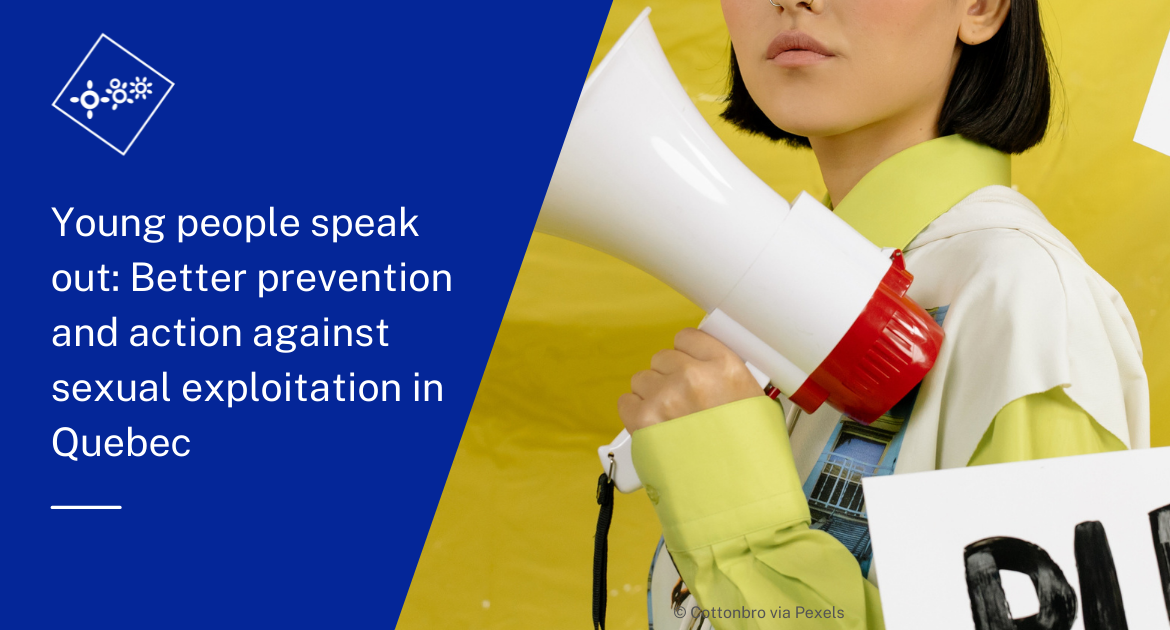
The IBCR is launching a new project: “Young people speak out – Better prevention and action against sexual exploitation”, which will take place over a period of 2 years in Montreal and on the North Shore, in Quebec, Canada. It will give a voice to adolescents so that they can influence prevention strategies and action against sexual exploitation in the new technological era brought about by the pandemic and new technologies.
In Quebec, as elsewhere, COVID-19 poses new challenges to the fight against the sexual exploitation of children. The stress generated by the pandemic, combined with the increased promiscuity of children in increasingly closed environments, has led to an explosion in cases of sexual violence.
Several institutions are sounding the alarm. During the pandemic, the Sûreté du Québec’s (SQ) Internet Child Sexual Exploitation Investigation Team has received 1,790 reports since the beginning of 2020, compared to 530 five years ago. In February 2021, Cybertip.ca – Canada’s national tipline for reporting the sexual exploitation of children on the Internet – reported an 88% increase in reports, particularly in cases of sextortion.
On the one hand, children at risk need a wide range of specialised services, all of which have become even less available due to the pandemic. As the Laurent Commission has pointed out, protection systems are overburdened and operate in a reactive rather than preventive mode.
On the other hand, preliminary research shows that young people involved in, or ‘consenting’ to, these types of abuse do not always see themselves as victims of sexual exploitation, but rather as a source of empowerment and autonomy in relation to their peers and adults. In addition to the fact that they do not take part in the debates, the result is that the majority of adolescents do not feel concerned by the awareness-raising and prevention campaigns that have been put in place. There is a growing gap between the realities experienced by young people and the approaches, tools, campaigns and measures used to prevent and act against sexual exploitation.
 This project therefore aims to equip young people to better understand the links between the pandemic, technologies and sexual exploitation so that they can become actors in protecting themselves and their peers. The involvement of young people will enable adaptations to be proposed so that the actions undertaken to prevent and act on sexual exploitation are more effective, relevant, sustainable and of high quality. The project also aims to promote to decision-makers, the community and parents, the need to take into account the perspective of young people in the fight against sexual exploitation, so that the message of prevention and action and the services available to them are better adapted. To this end, the Bureau will organise a series of meetings, discussions and training workshops to enable a collective of six groups of approximately twelve young people to come up with concrete recommendations to combat sexual exploitation in this time of pandemic.
This project therefore aims to equip young people to better understand the links between the pandemic, technologies and sexual exploitation so that they can become actors in protecting themselves and their peers. The involvement of young people will enable adaptations to be proposed so that the actions undertaken to prevent and act on sexual exploitation are more effective, relevant, sustainable and of high quality. The project also aims to promote to decision-makers, the community and parents, the need to take into account the perspective of young people in the fight against sexual exploitation, so that the message of prevention and action and the services available to them are better adapted. To this end, the Bureau will organise a series of meetings, discussions and training workshops to enable a collective of six groups of approximately twelve young people to come up with concrete recommendations to combat sexual exploitation in this time of pandemic.
Lines of action:
- Promote to decision-makers the need for meaningful participation of adolescents in the development of better targeted and more effective campaigns and policies
- Equip adolescents on sexual exploitation to be protective actors for themselves and their peers and pivotal interlocutors in defining measures to combat sexual exploitation
- Launch a publication with concrete recommendations from the young people’s collective to combat sexual exploitation and its various manifestations in the post-pandemic era
The project “Young people speak out – Better prevention and action against sexual exploitation” is financed by the Victims of Crime Fund (FAVAC) of the Quebec Ministry of Justice.
Proud partner of the City of Montreal’s Children’s Policy.






